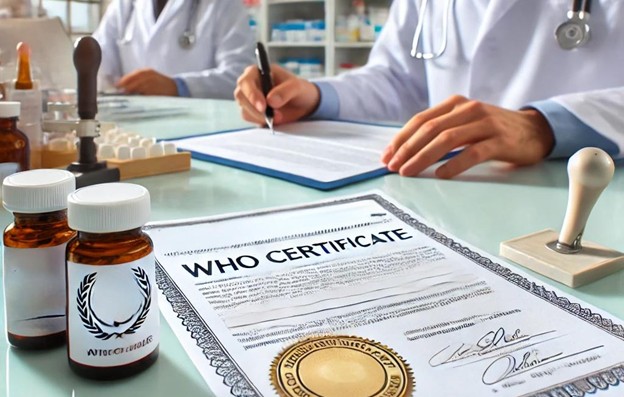Ensuring Pharmaceutical Quality: WHO Certificate and Apostille
In the pharmaceutical sector, it is crucial to ensure that medicinal products meet strict quality, safety, and efficacy requirements. This is not only essential for patient safety but also for obtaining approval in various markets. Two key requirements for the international distribution of pharmaceuticals are the WHO Certificate (Certificate of Pharmaceutical Product – CPP) and the apostille stamp.

Requirement for WHO Certificate
The WHO Good Manufacturing Practices (GMP) certificate is an internationally recognised standard that ensures pharmaceutical manufacturers adhere to strict quality requirements during the production process. The purpose of the WHO GMP certificate is to confirm that medicinal products are manufactured in compliance with Good Manufacturing Practice (GMP), providing the following benefits:
- Patient Safety: Ensures that medicinal products are safe, effective, and of high quality.
- International Recognition: The WHO GMP certificate enhances the manufacturer’s credibility and facilitates market entry in multiple countries.
- Regulatory Requirements: Many countries require this certificate for the approval and import of medicinal products.
To obtain the WHO certificate, pharmaceutical companies must demonstrate compliance with extensive requirements related to manufacturing facilities, quality management systems, personnel, equipment, and quality control.
Apostille Requirement – A Challenge for Many
For the WHO certificate and other official documents to be internationally recognised, an apostille is often required. An apostille is an official authentication confirming that a document is genuine and issued by a legitimate authority. This process can be complicated, as documents must be legalised according to the Hague Convention.
Many pharmaceutical companies face challenges in obtaining an apostille stamp, particularly when it comes to:
- Understanding the requirements in different countries
- Coordinating with relevant authorities
- Time consumption and administrative hurdles
How Mericon Can Help
Mericon offers tailored solutions for pharmaceutical companies needing WHO certificates and apostille stamps. We assist with:
- Guidance and Document Handling: We help prepare and submit applications for WHO certificates.
- Apostille Services: We manage the legalisation process for documents, including liaising with the Norwegian County Governor for apostilles.
- Efficient and Fast Processing: We ensure that documents are processed quickly and correctly to avoid delays in market access.
For more information on how we can assist your company, contact us at Mericon